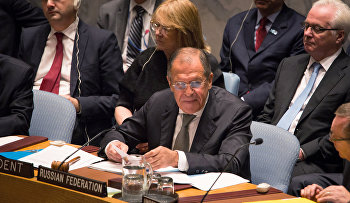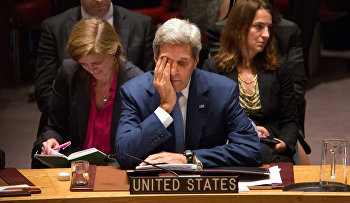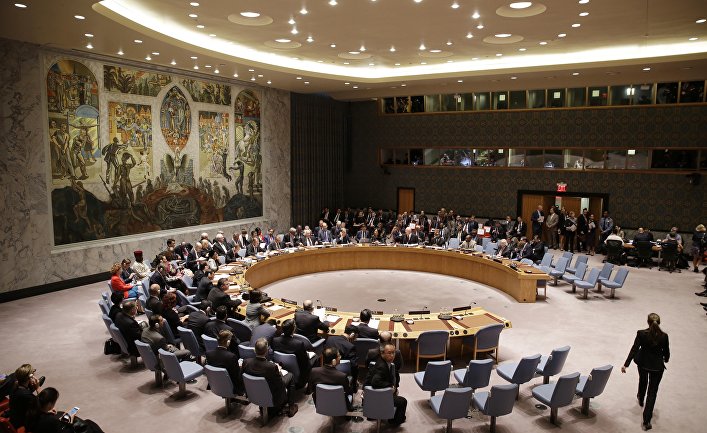The Head of Russia's Foreign Ministry, Sergey Lavrov, tabled a Moscow-prepared draft resolution at a ministerial meeting of the UN Security Council — entitled “Coordination of all forces opposing the 'Islamic State' and allied terrorist organizations.” Among the resolution's measures are: uniting the forces of all those ready to step up in the fight against Islamists; joint opposition to supporters of terrorists; compilation of a unified listing of foreign fighters, and kick-starting inter-Syrian negotiations. The day before, at a discussion on the same topic within the framework of the 70th session of the UN General Assembly, the American delegation gave much more attention to this issue than the Security Council. The efforts of Russia and the US, jointly and severally, to find a way forward in the struggle against terrorism were observed in New York by the correspondent of Komersant daily, Pavel Tarasenko.

Russian diplomats had already referred to yesterday's UN Security Council session – entitled “Maintaining peace and security – settlement of Middle East and North African conflicts amid the struggle against the terrorist threat in the region” — as the key event of Russia's presidency of the Council, which lasted for one month. Prior to the session Russia's permanent UN representative Vitaly Churkin commented that the matter had prompted strong support, and had been signed by representatives of around 60 countries.
'We are targeting #ISIS, al-Nusra and other terrorist groups' — Lavrov http://t.co/9QoD75q6dJ pic.twitter.com/WY1DjGnKdw
— RT (@RT_com) October 1, 2015
Immediately after UN Secretary-General Ban-Ki Moon spoke about the rights of the country's representatives, Sergey Lavrov gave his address. He said that the situation in the Middle East and North Africa had deteriorated seriously over the past year, “coming close to the point where we could talk about the destruction of the region's political map.” In Lavrov's view, the reason is that players in the international arena seem unwilling or unable “to look even two-to-three steps ahead of them.” Furthermore, everyone approached these conflicts “while failing to link their causes to the overall regional and historical context.” “Each player has 'done' Iraq, then Libya, Yemen, Lebanon, and Syria in turn — each time feeling utterly convinced they have solved the particular problem involved, and put everything back in place,” said Lavrov.
Ban Ki-moon tells world leaders to turn promises on paper into action on the ground. #UNGA week video recap: https://t.co/BrDqVp4uCF
— United Nations (@UN) October 3, 2015
The result of pursuing these policies is the so-called “Islamic State”– a grouping banned in Russia, and which – according to Lavrov –“has now acquired a smoothly-lubricated mechanism of repression, a stable source of income, a well-equipped army, and the elements for building weapons of mass destruction.” Russia's FM continued: “ISIL cells are multiplying in Libya, Afghanistan, and in other countries where they foment plants to seize Mecca, Medina, or Jerusalem – and to unleash their evil activities on Europe, Central and SE Asia, and Russia. While commenting on the shiploads of migrants making for Europe, he summed up by saying “What we have to stop is not the refugees – but the terrorists, and the wars they wage.”
Moscow sees the way out of the situation in pressing ahead with the measures listed in its draft UN Security Resolution, “Coordination of all forces opposing the 'Islamic State' and allied terrorist organizations.” Lavrov said yesterday that this document, prepared by Moscow, comes up for discussion in October. The key measures it envisages are uniting the forces of all those ready to step up in the fight against ISIL — and for kick-starting inter-Syrian dialogue based on the Geneva Communiqué of 30th June 2012.
There is no agreement on the first of these issues. Moscow promotes the idea that participation in the coalition should be opened to the armed forces of Iraq and Syria — while the USA rejects the idea of working with Assad's forces. On the second issue, agreement is somewhat closer. Earlier sources close to“Kommersant” within the Russian Foreign Ministry confirmed that remarks emerging from the American leadership (and specifically their demands for the immediate ouster of Bashar al-Assad) are impossible under the Geneva Accords. However, the words of American Secretary of State John Kerry that Washington is looking for “a smooth transition of power” in Syria would be compatible with the Accords.
Sergey Lavrov's detailed measures outlined included: joint action against the financing of terrorism (strict observation of sanctions against individuals or entities who do business with ISIL, along with“realizing the full potential” of the Financial Action Task Force on Money Laundering); inclusion of ISIL an identified suspect on the UN Security Council's anti-terrorist listings; compilation of a unified listing of foreigners fighting for ISIL; and also efforts in the fight against“incitement to terrorism.” “Russia as a multi-ethnic, multi-creed country has particular experience with the successful coexistence of differing ethnic and religious communities and groups. It's an experience we want to share,” said Lavrov in conclusion.
The Chinese FM Wang Yi gave his support to Lavrov's initiative, and attempted to make other attendees at the meeting realize that “it's not possible to stand on the sidelines in a crisis, but it's also wrong to blunder into a situation arbitrarily.” The French FM Laurent Fabius took a much tougher line, referring several times to President Assad as “the butcher of Syria,” and averring that “ISIL thrives thanks to the connivances of his regime.” Similar sentiments in similar vocabulary were expressed by British Foreign Secretary Phillip Hammond.
I told #UNSC just now: We reject advice of those who say the poison of Assad is the cure to the cancer of ISIL #UNGA pic.twitter.com/V0XTX94eQ4
— Philip Hammond (@PHammondMP) September 30, 2015
The US Secretary of State, John Kerry, arrived an hour late for the meeting, which caused the agenda of the meeting to be rearranged. Expressing his thanks to Russia for having “felt it important to focus attention” on the topic of the war against terror, Kerry outlined the importance of a common line on the issue, called for a toughening of the war with the corruption and propaganda of the Islamists, and referred to a humanitarian catastrophe “going on right now in many places.” Speaking of the air attacks which Russia has initiated, Kerry said that Washington supported them, provided that the motivation for them was the war with ISIL, and not as support for the regime of President Assad. “ISIS cannot be defeated while Assad remains as President” the Secretary of State claimed, adding that “no answer to the civil war in Syria can be found” on the basis of an alliance with the Syrian president. Lavrov listened utterly impassively to Kerry's address.
As @POTUS said, we are willing to work with any nation –including #Russia & #Iran- to resolve conflict in #Syria. https://t.co/CTBbPgOJKy
— John Kerry (@JohnKerry) September 28, 2015
#Lavrov-@JohnKerry. Round 3│Лавров-Керри. Раунд #3 pic.twitter.com/YWxSOPDix4
— MFA Russia (@mfa_russia) September 30, 2015
In their participation in the Security Council meeting, the American delegation found further opportunity to bring attention to the issue of the war on terror – involving the summit scheduled at American initiative for Tuesday, due to be attended by representatives from over one hundred countries. Opening this meeting US President Barack Obama called for a global response to the threat which ISIL, “Boko Haram” and allied terrorist organizations pose. Obama admitted that victory in this struggle “would not come easily,” and achieving these ends “would take some time.”
Free speech. Freedom of religion. Rule of law. These are all critical to countering violent extremism. #UNGA http://t.co/P6cd4a8EKT
— The White House (@WhiteHouse) September 29, 2015
Jordanian King Abdullah II used the summit to call ISIL “the greatest global threat of our time.” Leaders of Arab nations spoke of the need to bolster the fight against the Islamists both militarily and financially. European nations drew attention to their own domestic issues – the stream of Syrian refugees making for Europe as a result of the war in Syria. Barack Obama spoke of the need for the war against ISIL to comprise many elements – both military, and economic – and for support for democratic change in Middle Eastern countries.
Watch His Majesty King Abdullah II Speech at the 70th @UN General Assembly #JORoyalVisit #HMKJO #Jordan #UNGA https://t.co/d4Q2Antmvm
— RHC (@RHCJO) September 28, 2015
The Russian delegation was represented at the meeting, although Moscow had initially opposed the format of the discussions. Moscow's particular displeasure was occasioned by the presence of a Kosovan representative at the meeting – a semi-recognized state which is not a UN member. Commenting on this issue, Vitaly Churkin accused the US of “flagrant disrespect” for the UN and its General Secretary, Ban-Ki Moon.
Despite this, and the “competitiveness” which pervaded certain issues of the proceedings, the vocabulary used in the discussions at both events was remarkably similar. Practically every participant in the 70th General Assembly of the UN agreed – at least, publicly – that radical Islam is one of our age's greatest threats, against which the struggle should have begun much earlier. But it is, at least, commencing now.
Among the topics being discussed on the sidelines of the 70th session of the UN General Assembly was the possibility of reforming the Security Council. A meeting was held in New York yesterday, sponsored by France and Mexico, to discuss the proposal that the right of veto should be restricted during debates involving crimes against humanity, war crimes, and genocide. Paris wants the five permanent Security Council members – Britain, China, the USA, Russia, and France – to agree voluntary reductions in some of their rights, to prevent blockages in the work of the UN's most important activity. The idea that reform is long overdue was brought home in French FM Laurent Fabius's address to the Security Council yesterday. “In the light of the Syrian drama, and the limitless savagery of ISIL, the Security Council has, regrettably, acted as usual as a Council Of The Toothless.”
However, Russian officials believe the right of veto helps to preserve the existing system of checks and balances. “The right of veto is what prompts the need to find compromises, in the everyday work of the Security Council on any issue. Pressure is exerted by the possibility that anyone could block a resolution or prevent voting on Lord-knows-what, and use only worked-out documents,” said Russia's permanent UN representative Vitaly Churkin earlier to “Kommersant.” Churkin believes this reform will never get the support of Russia, China, or the US either.
FM Lavrov: Asia, Africa and Latin America don’t have proper representation in UN SC. Russia supports reform proposal. pic.twitter.com/GijCDOlsZV
— Russian Embassy, UK (@RussianEmbassy) August 15, 2015
Such unofficial opinions also got the support of the UN Secretariat staff. One such staffer told “Kommersant” his reminiscences of how the right of veto provoked controversy during the compilation of the UN Charter. In 1945 at the San Francisco conference, where the founding charter of the organization was being prepared, intense dissatisfaction was voiced by Latin American countries and Australia. In response to this, the US delegate, Tom Connelly, tore up his copy of the Charter in a theatrically demonstrative fashion, and cast the scraps of paper at the “rebellious” delegates saying “Go home, and tell them that it was torpedoed by a veto! But make sure you tell them that you wrecked the UN Charter too!” Despite all the debate and attempts to reform it, the veto remains unshakable.
Despite this, according to “Kommersant's” source within the UN Secretariat, a different idea is quite possible in the next few years – that of expanding the number of Security Council members. There are complaints against the make-up of the permanent membership from numerous countries — including Brazil, Germany, India and Japan. This quartet of disquiet held a meeting on the sidelines of the General Assembly – during which the German Chancellor Angela Merkel said “we need a new working methodology to solve these issues. This makes the reorganization of the Security Council a necessity, to bring in changes which would more accurately reflect the balance of power in the world, than the present set-up.”
Germany's Merkel says U.N. Security Council must be reformed http://t.co/jrkW66Tkp5
— Reuters Top News (@Reuters) September 26, 2015
However, the admission of new countries into this elite club is likely to displease rival countries who got left out. The way out of this situation, as “Kommersant's” source within the Secretariat suggested, would be reviving the former practice of a status for “semi-permanent members.” Holders of this status would be given extended tenure of their seat on the Security Council (for example, for eight years, instead of the present two), and the possibility of being immediately re-elected to it.






